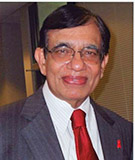
Controlling Heart Failure and Living Longer
New Treatments Brighten Future for Heart Failure Patients – Part III

Although heart failure (HF) is a chronic, progressive and often disabling disorder, you can stall its development and further progression with proper treatment. Patients usually say after HF is controlled, they can now do things that they couldn’t do before.
‘Lifestyle changes’ is the first step in the management. Even small changes that you make in your everyday choices will help to keep your HF in check.
-
Fluid restriction: Since HF causes to retain fluids, limiting the daily fluid intake is of paramount importance. Also, monitor your weight and any sudden weight gain like 2-3 pounds toward the end of the day is a sign that HF is not well controlled.
-
Eat a heart healthy diet – meaning a low-fat, low-salt diet with fluid restriction as advised; and diabetic diet if needed. A dietitian can help design a proper diet for you.
-
Stay active: Don’t think a diagnosis of HF means you have to put yourself to bed rest. Staying physically active can be quite beneficial; this will lower the blood pressure, improve circulation, ward off fluid retention and give you a sense of well being. In fact, we put many of our patients through a period of cardiac rehab specially tailored to suit their needs.
-
Limit your alcohol and may be caffeine too. Alcohol in any form tends to depress the heart muscle or myocardium. Chronic excessive alcohol intake will result in ‘alcoholic cardiomyopathy’ leading to heart failure. So, beware!
-
Learn to relax: Stress reduction and cultivating a peaceful attitude in all aspects of life will be very helpful. Always stay positive.
-
Treat concomitant diseases well, especially hypertension and Diabetes Mellitus well.
Medications: Some major breakthroughs that happened over the past few years have definitely made the life of every HF patient much better. Your doctor may start you with a simple diuretic or water pill to flush out the excess fluid. Sometimes, a second diuretic like Aldactone (Aldosterone antagonist), which potentiates the effect of the first one, will be added. Another class of drugs that is helpful and often started along with diuretics includes an ACE Inhibitor or ARB (a receptor blocker). These drugs will cause blood vessels to relax, improve circulation and lower BP. They also help the heart to pump better, thus increasing the cardiac output and reducing shortness of breath. Other drugs include a beta-blocker to regulate the heart rate and BP and hydralazine and isosorbide dinitrates that will relax the blood vessels and boost blood flow.
Researchers have recognized for some time that our ‘neurohormonal systems’ also have a role to play in the development and progression of HF, more specifically an enzyme called ‘neprilysin.’ And now a new combination drug that will inhibit the unwanted enzymic activity of ‘neprilysin’ and increase the peripheral blood flow called ‘saccubitril – valsartan’ (marketed as ‘entresto’) has arrived and promises to be therapeutically effective for HF patients. The development of this drug comes after decades of research.
In spite of the advances, there is still a group of patients who have reached end stage heart failure and continue to deteriorate in spite of optimal therapy. This often happens in those patients with markedly dilated hearts (dilated cardiomyopathy) and have stopped responding to drugs. They will need a left ventricular assist device (LVAD), a special pump, to support the failing heart. This is a surgically implanted, battery-operated, mechanical pump, which helps the left ventricle (main pumping chamber of the heart) pump blood to the rest of the body. LVADs can be used as:
-
Bridge-to-transplant therapy: This is a life-saving therapy for patients awaiting a heart transplant. Patients use the LVAD until a new heart becomes available. In some cases, the LVAD is able to restore the failing heart, even eliminating the need for a transplant.
-
Destination therapy: Some patients are not candidates for heart transplants. In this case, patients can receive long-term treatment using an LVAD, which can prolong and improve patients' lives.” *
When all these measures fail we go to the ultimate treatment, the permanent cure for end stage heart failure – ‘heart transplantation.’ More about it later.
* Ref: ‘Stanford Health News’
To be continued…
Arun C. Gulani, M.D., M.S., is director and chief surgeon of Gulani Vision Institute in Jacksonville. He can be reached at [email protected] or visit www.gulanivision.com